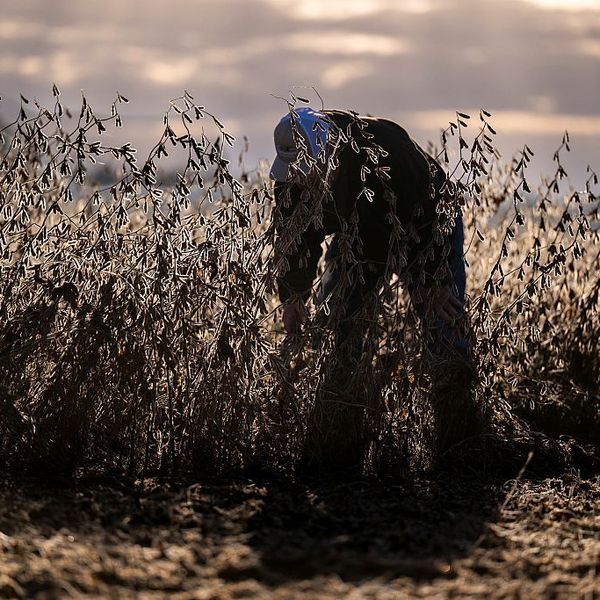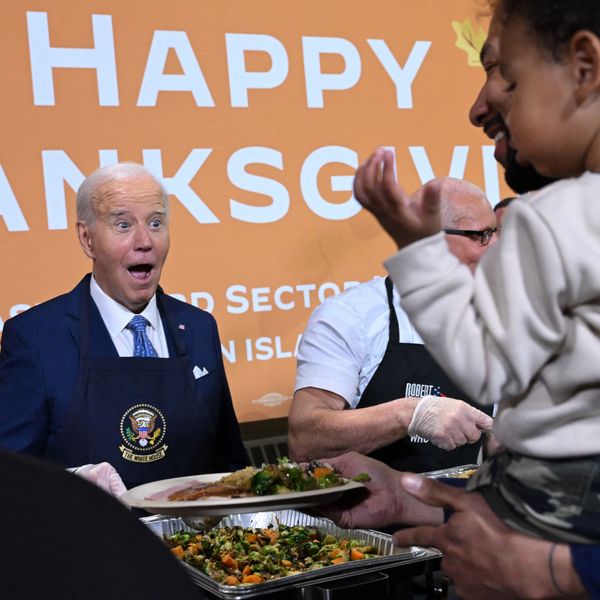US Drought Brings Mass Livestock Slaughter, Soaring Food Prices to World
Soaring food prices and mass livestock slaughter are ramifications hitting the world now as a result of the U.S. drought, a report from investment bank Rabobank International says.
These impacts also highlight a global food system unprepared to deal with the impacts of climate change, tied to an industrial livestock raising system dependent upon monocrops produced in a centralized location, in the case of cattle, fed to animals whose physical systems are not set up to ingest them.
Euphemistically referring to the slaughter as "herd liquidation" Rabobank warns this will lead to 14% jump in food prices, the Guardian writes, adding that there has already been a 31% increase in the price of pork.
Explaining the connection between the slaughter and food price increases, the Guardian reports:
Nicholas Higgins, a Rabobank commodities analyst and author of the report, said: "There will be an initial glut in meat availability as people slaughter their animals to reduce their feed bills. But by next year herds will be so reduced that there won't be enough animals to meet expected demand and prices will soar."
The report doesn't foresee a repeat of the food crisis of 2008 when staples like wheat and rice were severely affected, but does predict the developing world "with its high demand elasticity, especially to meat, to ration import demand of grains, oilseeds and meat most heavily, leading consumption growth to slow and even recede for a period as prices rise."
An Urgent Message From Our Co-Founder
Dear Common Dreams reader, The U.S. is on a fast track to authoritarianism like nothing I've ever seen. Meanwhile, corporate news outlets are utterly capitulating to Trump, twisting their coverage to avoid drawing his ire while lining up to stuff cash in his pockets. That's why I believe that Common Dreams is doing the best and most consequential reporting that we've ever done. Our small but mighty team is a progressive reporting powerhouse, covering the news every day that the corporate media never will. Our mission has always been simple: To inform. To inspire. And to ignite change for the common good. Now here's the key piece that I want all our readers to understand: None of this would be possible without your financial support. That's not just some fundraising cliche. It's the absolute and literal truth. We don't accept corporate advertising and never will. We don't have a paywall because we don't think people should be blocked from critical news based on their ability to pay. Everything we do is funded by the donations of readers like you. Will you donate now to help power the nonprofit, independent reporting of Common Dreams? Thank you for being a vital member of our community. Together, we can keep independent journalism alive when it’s needed most. - Craig Brown, Co-founder |
Soaring food prices and mass livestock slaughter are ramifications hitting the world now as a result of the U.S. drought, a report from investment bank Rabobank International says.
These impacts also highlight a global food system unprepared to deal with the impacts of climate change, tied to an industrial livestock raising system dependent upon monocrops produced in a centralized location, in the case of cattle, fed to animals whose physical systems are not set up to ingest them.
Euphemistically referring to the slaughter as "herd liquidation" Rabobank warns this will lead to 14% jump in food prices, the Guardian writes, adding that there has already been a 31% increase in the price of pork.
Explaining the connection between the slaughter and food price increases, the Guardian reports:
Nicholas Higgins, a Rabobank commodities analyst and author of the report, said: "There will be an initial glut in meat availability as people slaughter their animals to reduce their feed bills. But by next year herds will be so reduced that there won't be enough animals to meet expected demand and prices will soar."
The report doesn't foresee a repeat of the food crisis of 2008 when staples like wheat and rice were severely affected, but does predict the developing world "with its high demand elasticity, especially to meat, to ration import demand of grains, oilseeds and meat most heavily, leading consumption growth to slow and even recede for a period as prices rise."
Soaring food prices and mass livestock slaughter are ramifications hitting the world now as a result of the U.S. drought, a report from investment bank Rabobank International says.
These impacts also highlight a global food system unprepared to deal with the impacts of climate change, tied to an industrial livestock raising system dependent upon monocrops produced in a centralized location, in the case of cattle, fed to animals whose physical systems are not set up to ingest them.
Euphemistically referring to the slaughter as "herd liquidation" Rabobank warns this will lead to 14% jump in food prices, the Guardian writes, adding that there has already been a 31% increase in the price of pork.
Explaining the connection between the slaughter and food price increases, the Guardian reports:
Nicholas Higgins, a Rabobank commodities analyst and author of the report, said: "There will be an initial glut in meat availability as people slaughter their animals to reduce their feed bills. But by next year herds will be so reduced that there won't be enough animals to meet expected demand and prices will soar."
The report doesn't foresee a repeat of the food crisis of 2008 when staples like wheat and rice were severely affected, but does predict the developing world "with its high demand elasticity, especially to meat, to ration import demand of grains, oilseeds and meat most heavily, leading consumption growth to slow and even recede for a period as prices rise."

